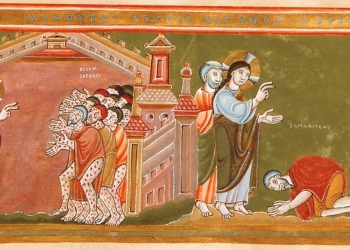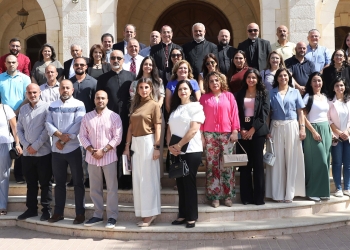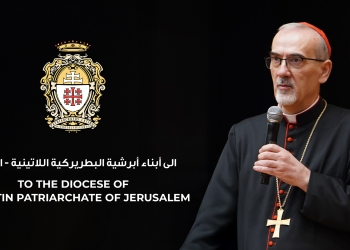From March 10th until March 16th, 2024, three members of the Holy Land Commission: Prof. Bartholomew, Mr. Tim Milner, and Ms. Donna Milner, conducted their annual site visit to the Holy Land. They oversaw the different projects administered by the Latin Patriarchate projects and funded by the EQUESTRIAN ORDER OF THE HOLY SEPULCHRE OF JERUSALEM, met with H.B. Card. Pierbattista Pizzaballa, Latin Patriarch of Jerusalem, several LPJ Staff, recipients of aid, as well as visited different institutions of the Patriarchate.
The visit was led by Mr. Sami El Yousef, CEO of the Latin Patriarchate, who expressed his contentment with their visit saying: “We are grateful for the visit of the members of the Holy Land Commission, and especially for insisting to come not only for the regular business items and site visits, but more importantly for their solidarity visit as they wanted to be close to their brothers and sisters in the Holy Land and hear their challenges. The visits to institutions, parishes, schools, and homes of needy families who were severely affected by the war gave them a clear firsthand account of the issues the Church of the Holy Land must deal with. Briefings and strategic discussions during many meetings were rich, honest, thought-provoking, and were very much strategic, intended to strengthen the relationship between the Latin Patriarchate and the Order of the Holy Sepulcher.”
Their site visit began by visiting several Christian residences of the Old City of Jerusalem, who are benefactors of the Humanitarian aid program at the Latin Patriarchate, which is administered by Ms. Dima Khoury. The HLC committee learned all about the project’s success and the current need amidst the current events the country is faced with. Mr. Milner communicated: “Going with Dima to the local homes to visit those receiving aid is always a highlight of our visits. Seeing how desperate their situations can be yet how grateful and faithful they are, is always the most heart-touching part of the trip”.
Following that, they visited St. Rachel Center for immigrant children in Jerusalem, which is established by Saint James Vicariate of the Patriarchate. The center provides a safe, healthy, and nurturing daycare for children of Migrant parents who work long hours to make ends meet. The premises were completely renovated thanks to the assistance of several donors, foremost among them the Equestrian Oder of the Knights of the Holy Sepulcher. They met Fr. Matthew Coutinho, Patriarchal Vicar for the Migrants and Asylum Seekers, at the center. Mr. Milner shared: “Fr. Coutinho explained how challenging the migrant’s life is and how many hurdles they face each day. It was hard to hear how difficult it is for these people to practice their faith. Later in the week, Donna and I “popped” into a meeting at the LPJ offices with the VMAS priests and sisters. WOW! We were stunned to see how many communities there are – Chinese, Filipino, African, Indian, Romanian, Sri Lankan and Ukrainian. It showed us the Universal Catholic Church right in the room. We felt blessed to be part of”.
The next day, they visited the LPJ School and the parish of Beit Sahour. Fr. Issa Hijazin, the parish priest, and Mr. Anton Jaraisseh, the principal of the school, spoke about the different job opportunities they have previously created for the parishioners, which help alleviate financial burdens amidst times of crisis. During their visit, they toured the territory where they saw the safe space provided by the parish for Christian youth and families to enjoy their free time and fellowship. They also visited the LPJ Kindergarten and multiple classrooms and met with the students.
Then, they made their way to Bethlehem University where they met with Br. Hernan Santos, the Vice Chancellor of the University, Fr. Iyad Twal, Executive Vice President of Bethlehem University, and Dr. Iman Saca, the Vice President for Academic Affairs, to discuss various ways LPJ schools and the university can collaborate in the future. They aim to support and fund the development of skills of young adults to build a secure future. “Particular attention was dedicated to the reduced projects funding this year and the need to look at ways to re-establish the projects fund,” Mr. Sami El-Yousef shared. They also briefly discussed the success of the AFAQ joint project in the community.
On the third day, they visited Beit Afram Elderly House, where they learned more about the different ways the Patriarchate institutions help support the community and create job opportunities. They also met with Fr. Bashar Fawdleh, the parish priest of Taybeh, and the Rosary Sisters. and Then, they visited the Seminary of Beit Jala where they met with Fr. Bernard Pogi, the Rector of the Seminary and discussed the major expansions in the pastoral care services provided by the Patriarchate, such as the Spiritual Formation Center at the Seminary. Mr. Milner was surprised and glad to see the flourishing of the new ministry program saying: “I was very surprised to see how much the program has grown, he had over 100 students in the last classes”. They also discussed the work of the new Counseling Center, with Fr. Tony Haiin, and the work of the Family Center, with Fr. Ibrahim Nino. “It is much-needed work in the diocese,” said Mr. Milner. They got to learn more about the youth activities from Fr. Fr. Louis Salman Youth Chaplain.
During the week, the HLC committee had many meetings with the Patriarchate Bishops, priests, and staff. They were briefed about the emergency humanitarian intervention whether in Gaza or on the West Bank that has supported over 11,000 people to date. They reviewed the allocated funds to the various main works of the Patriarchate in education, humanitarian aid, and pastoral care.
“Because of the war and the increased security, we were not able to visit as many sites as normal. Yet, as always, it was a wonderful visit. The work that the LPJ does to support the Christians in the Holy Land is so very needed and critical to maintaining a Christian presence in the land Our Lord walked. In the last 5 years, between COVID and the war, the Holy Land has experienced extremely tough times. Despite the difficulty of finding flights, we insisted on coming and assuring the people that we care for them, and they are not alone,” said Mr. Milner.



















